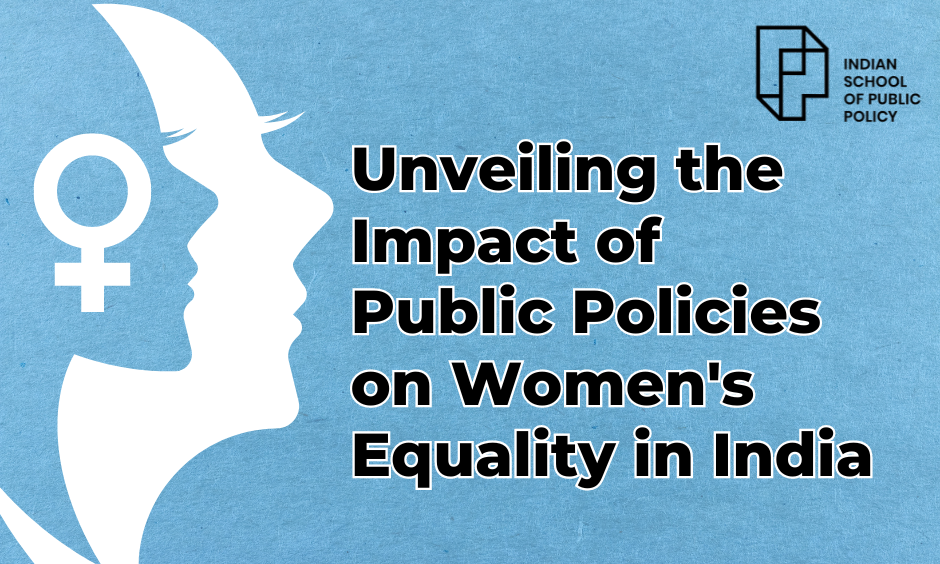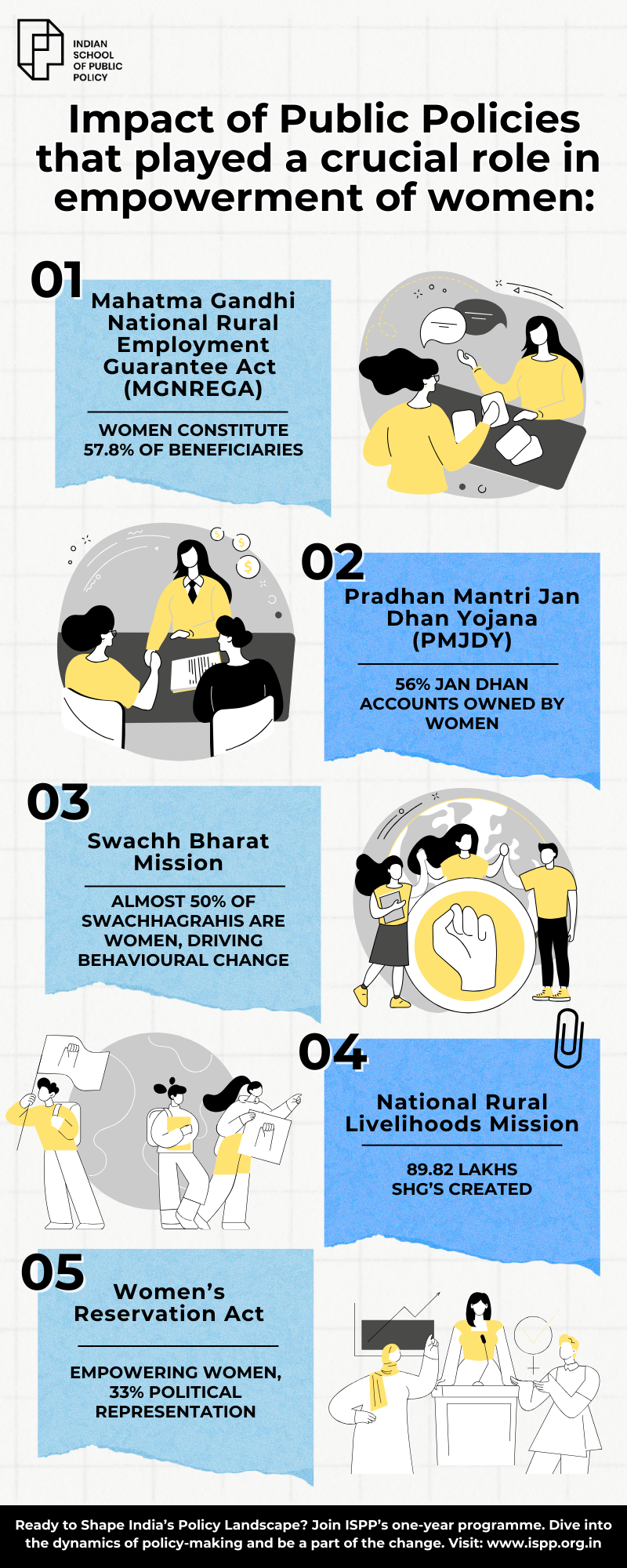
Unveiling the Impact of Public Policies on Women’s Equality in India

Society has long perpetuated the notion that biological differences between men and women justify unequal treatment and the assignment of specific roles to women. A complex array of institutions and state policies reinforced traditional gender roles, portraying women as supplementary, part-time earners supported by men. The legal framework in India perpetuated gender inequalities, with married Hindu women being denied the right to adopt children independently, as fathers were considered natural guardians. Despite clauses advocating equal wages, women’s rights as independent workers were often overlooked or inadequately implemented.
However, the inclusion of women in the 6th plan shows that pressure from burgeoning women’s movements prompted some acknowledgement of gender issues within state policies. The plan adopted a multi-pronged strategy for the development of women, mainly focusing on three core sectors: health, education, and employment. For the first time in the history of planning in India, the plan document included a chapter on ‘Women and Development’, which emphasised economic independence for women, access to healthcare, and family planning. (Konwar, 2019)
The state’s role in shaping gender norms and practices underscores the importance of advocating for gender-inclusive policies and challenging institutionalised discrimination. By addressing systemic barriers and promoting gender equality through public policies, states can work towards dismantling entrenched gender hierarchies and fostering more equitable opportunities for all individuals, regardless of gender.
Let us examine how specific public policies have played a crucial role in challenging gender stereotypes and advancing the empowerment of women:
- Mahatma Gandhi National Rural Employment Guarantee Act ( MGNREGA) has significantly empowered women in India by providing them with opportunities for economic independence, social inclusion, and participation in decision-making processes. MGNREGA has proven beneficial for women, especially in rural areas, who often face limited economic opportunities. By participating in MGNREGA work, women can earn a steady income, contribute to household finances, and gain financial independence. MGNREGA has challenged traditional gender roles, which may have restricted their mobility and employment opportunities. Women are involved in various labour-intensive tasks such as road construction, afforestation, and water conservation, challenging stereotypes about women’s work. The Act creates a legal and institutional framework for the right to work and wage parity at the minimum wage. The law is particularly important for women workers by reserving at least one-third of jobs for women, creating opportunities for unskilled manual labour, mandating that work be provided locally, and stipulating the provision of on-site child care for children under six years of age if there were more than five at a given worksite. According to the latest statistics from the Union Ministry of Rural Development, women comprise 57.8% of the scheme beneficiaries in 2022-23. (Nair, 2023). MGNREGA has been instrumental in promoting women’s empowerment in India by providing them with economic opportunities, enhancing their participation in the workforce, fostering skill development, promoting social inclusion, and reducing gender disparities in rural areas. Through its inclusive and participatory approach, MGNREGA has empowered women to assert their rights, contribute to their families’ welfare, and actively participate in developing their communities.
- Pradhan Mantri Jan Dhan Yojana (PMJDY): Launched by PM Narendra Modi on 28th August 2014,PMJDY represents a stride towards financial inclusivity for historically marginalised and financially underserved communities. There was a significant increase in the number of women who had access to formal banking services with minimal documentation and no minimum balance. 56% of the currently existing Jan Dhan Yojana accounts belong to women.(AIR, 2023)The International Labour Organization highlights a persistent global disparity in economic opportunities between men and women. Statistics reveal that fewer than half of eligible women engage in the labour force, in stark contrast to the 75% participation rate among men. Additionally, women are disproportionately represented in precarious, low-paying jobs compared to men. The Covid-19 pandemic accentuated these inequalities, with women bearing the brunt of job losses and economic hardship.(National Council of Applied Economic Research,2023) Providing gender-specific access to financial services becomes imperative for empowering women to navigate unemployment challenges more effectively. With access to bank accounts, women have a safe and convenient way to save money and access credit facilities. This allows them to build financial security, invest in their family’s education, and pursue entrepreneurial activities by accessing credit for small businesses. With access to formal banking services, women are empowered to participate more actively in household decision-making. They can contribute to financial planning and investment decisions, exerting more significant influence over family affairs and improving their well-being.
- Swachh Bharat Mission: The Swachh Bharat Mission significantly impacted women’s empowerment in India. Before SBM, many women in rural areas faced significant health risks due to open defecation—lack of access to sanitation facilities exposed women to diseases and infections. The Swachh Bharat Mission has prioritised the construction of household toilets and community sanitation units, ensuring women’s access to safe and hygienic sanitation facilities. It has improved their health and well-being and enhanced their safety, dignity, and convenience. Additionally, SBM’s emphasis on behavioural change has challenged societal norms and cultural taboos surrounding sanitation. Swachhagrahis, the foot soldiers of Swachh Bharat Mission are motivators for behaviour change in sanitation practices. Almost 50% of swachhagrahis are women (Department of Drinking Water and Sanitation).Awareness campaigns and community engagements by swachhagrahis have initiated dialogues on sanitation and menstrual hygiene, contributing to societal change and fostering a more open discourse. In conclusion, the Swachh Bharat Mission’s impact on women’s empowerment extends beyond cleanliness. By addressing gender disparities, providing access to dignified facilities, fostering economic opportunities, and promoting active participation, SBM has paved the way for a more inclusive and equitable society, ensuring a cleaner, safer, and more empowered future for all.
- National Rural Livelihoods Mission: The National Rural Livelihoods Mission is an anti-poverty programme centred around empowering women in rural India. It adopts a women-centric approach, recognising the importance of women’s empowerment in poverty alleviation and rural development. The mission focuses on organising women into self-help groups to take collective action for their socioeconomic advancement. It focuses on fostering sustainable livelihoods and economic independence among women by providing them with opportunities for skill development, entrepreneurship, and access to financial services. According to data published by PIB, the mission has mobilised 9.89 crore women from rural households into 89.82 lakh SHGs as of November 2023. (PIB, 2023). DAY-NRLM is driving a women-led revolution in India’s villages, transforming lives and communities while combating poverty.
- Women’s Reservation Act: The passage of the women’s reservation bill in the Lok Sabha in September 2023 marks a significant milestone in India’s journey towards gender equality and women’s empowerment. The bill, introduced in parliament 27 years prior, aims to reserve 33% of seats for women in both the Lok Sabha and state legislative assemblies. The fact that both Houses of Parliament unanimously supported the proposal demonstrates how crucial it is for women to participate in decision-making at all levels of government. The move is expected to increase the presence of women in political leadership roles, which can lead to more inclusive and responsive policymaking, with greater emphasis on addressing gender-specific concerns such as access to healthcare, education, and economic opportunities. Moreover, it catalyses broader societal change by challenging traditional gender norms and stereotypes that have historically limited women’s political participation.
Public policies in India have played a crucial role in empowering women by addressing various social, economic, and political barriers. Despite these advancements, significant challenges persist, including gender-based violence, unequal access to resources, and cultural barriers that hinder women’s participation in society. This requires comprehensive strategies that address both structural inequities and societal attitudes towards gender roles, ensuring that women have equal opportunities to realise their full potential.
While progressive state policies are undoubtedly crucial, achieving true gender equality requires changes in our everyday lives to break down entrenched biases and foster a more equitable society. Reflecting on Simone de Beauvoir’s profound observation, “It is perfectly natural for the future woman to feel indignant at the limitations posed upon her by her sex. The real question is not why she should reject them, but rather why she accepts them,” prompts us to reconsider the societal norms and expectations that perpetuate gender inequality. It’s a reminder that each of us has a role to play in challenging these norms and promoting gender equality in our everyday interactions within our homes and workplaces.
Register your Interest to Study at ISPP
Infographic

References:
References:
1. Konwar. (2019, May). Women Empowerment in the Five Year Plans of India. Retrieved March 8, 2024,https://www.researchgate.net/publication/332780543_Women_Empowerment_in_the_Five_Year_Plans_of_India
2..Wikipedia contributors. (2024, February 17). Mahatma Gandhi National Rural Employment Guarantee Act, 2005. Wikipedia. https://en.wikipedia.org/wiki/Mahatma_Gandhi_National_Rural_Employment_Guarantee_Act,_2005
3 Nair, S. K. (2023b, January 1). Women break new ground in Mahatma Gandhi National Rural Employment Guarantee Scheme. The Hindu. https://www.thehindu.com/news/national/women-break-new-ground-in-mahatma-gandhi-national-rural-employment-guarantee-scheme/article66323804.ece
4. Jan Dhan accounts cross 50 crore mark. (2023, August 19). News on Air. Retrieved March 8, 2024, from https://newsonair.gov.in/News?title=Jan-Dhan-accounts-crosses-50-crore-mark%2C-with-56-percent-of-them-belonging-to-women%3B&id=466367#:~:text=The%20total%20number%20of%20Jan,than%20two%20lakh%20crore%20rupees.
5. The Gender Implications of the Jan Dhan Yojana – NCAER | Quality . Relevance . Impact. (2023, August 29). NCAER | Quality . Relevance . Impact. https://www.ncaer.org/news/the-gender-implications-of-the-jan-dhan-yojana
6.Department of Drinking Water and Sanitation. (n.d.). Gender and Inclusive Sanitation. https://jalshakti-ddws.gov.in/sites/default/files/MGISC_Gender_and_Inclusive_Sanitation_WASH_Network.pdf
7..Women Empowerment under Deendayal Antyodaya Yojana – National Rural Livelihoods Mission. https://pib.gov.in/PressReleasePage.aspx?PRID=1985466#:~:text=The%20Mission%20has%20 mobilized%209.89,Community%20Investment%20Fund%20(CIF).
8.ET Government & www.ETGovernment.com. (2022, October 31). Opinion: DAY-NRLM – A women-led revolution unfolding in India’s villages. https://government.economictimes.indiatimes.com/news/governance/opinion-day-nrlm-a-women-led-revolution-unfolding-in-indias-villages/95207216
9. India passes law to reserve seats for women legislators | UN Women – Headquarters. (2023, October 4). UN Women – Headquarters. https://www.unwomen.org/en/news-stories/feature-story/2023/10/india-passes-law-to-reserve-seats-for-women-legislators

Diksha Agrawal
Programme Advisor – Admissions
Diksha Agrawal, a Sociology graduate from Miranda House and postgraduate from Delhi School of Economics, embarked on her professional journey as a research fellow for Prashant Kishore’s Jan Suraaj initiative. Traveling across various districts of Bihar, she gained profound insights into the diverse needs of communities, igniting a deep interest in the field of public policy.
Furthering her engagement in politics and governance, Diksha served as a consultant for Inclusive Minds, political consultancy working for Indian National Congress during the Chhattisgarh elections. This role provided her with invaluable insights into the socio-political landscape of the state, reinforcing her determination to drive positive change through effective policy formulation and implementation.


